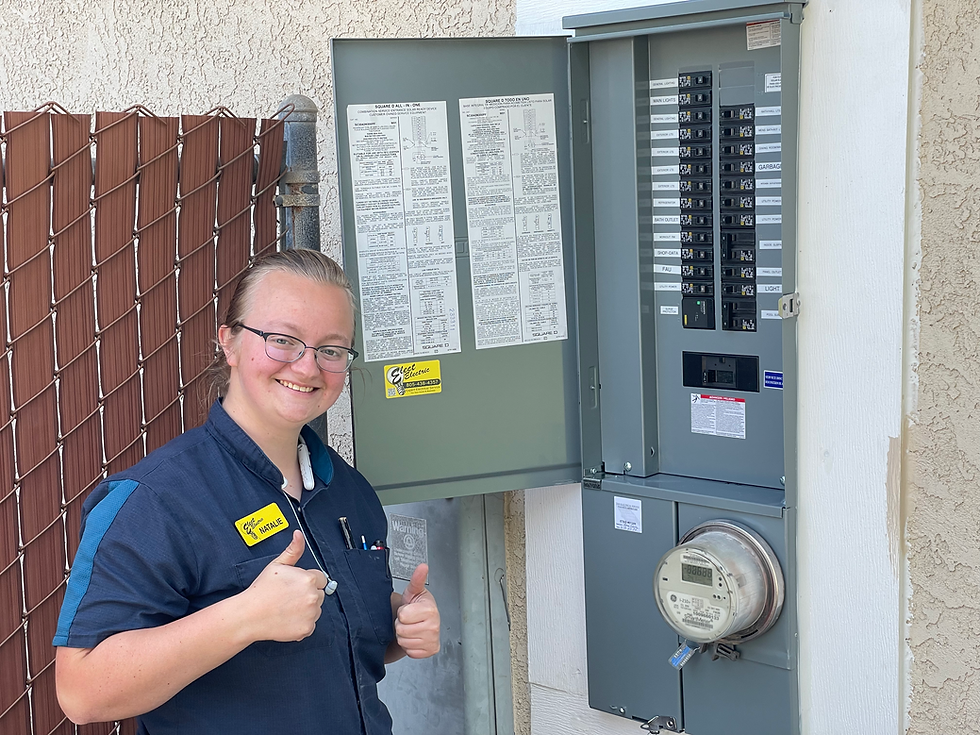Troubleshooting Electrical Issues Made Simple
- Daniel Ehinger

- Oct 28, 2025
- 4 min read
When your lights flicker or your outlets stop working, it can feel like a mystery you’re not sure how to solve. But don’t worry - troubleshooting electrical issues doesn’t have to be complicated or scary. With a little know-how and some practical steps, you can identify common problems and decide when it’s time to call in the pros. Ready to take control of your home’s electrical health? Let’s dive in.
Troubleshooting Electrical Issues: Where to Start
First things first: safety. Before you touch any switches, outlets, or panels, make sure your hands are dry and you’re standing on a dry surface. Electricity and water don’t mix, and safety is your top priority.
Now, let’s talk about how to approach troubleshooting. Start by identifying the symptoms. Are certain outlets dead? Is a circuit breaker tripping repeatedly? Are your lights dimming or flickering? These clues help narrow down the cause.
Here’s a simple checklist to get you going:
Check your circuit breaker panel: Look for any tripped breakers. If you find one, reset it by flipping it fully off and then back on.
Test affected outlets and switches: Use a voltage tester or plug in a device you know works.
Look for visible signs of damage: Burn marks, loose wires, or unusual smells near outlets or switches.
Consider recent changes: Did you add a new appliance or do any electrical work recently?
If you’re dealing with a tripped breaker that keeps flipping back, or outlets that don’t work despite resetting breakers, it’s a sign of a deeper issue. That’s when expert diagnosis is key.

What are the three most common causes of electrical problems?
Understanding the root causes can save you time and frustration. Here are the top three culprits behind most electrical issues in homes:
1. Overloaded Circuits
When too many devices draw power from the same circuit, it can overload and trip the breaker. Think about your kitchen or home office where multiple gadgets run simultaneously. Overloads are common but preventable by spreading out your electrical load or upgrading your panel.
2. Faulty Wiring
Old or damaged wiring is a serious concern. It can cause flickering lights, outlets that don’t work, or even pose fire hazards. If your home is older, wiring might not meet today’s safety standards. Signs include frequent breaker trips, buzzing sounds, or warm outlets.
3. Defective Outlets or Switches
Sometimes the problem is as simple as a worn-out outlet or switch. These components wear down over time and can cause intermittent power loss or sparks. Replacing them is usually straightforward but should be done carefully.
Knowing these causes helps you spot problems early and decide when to call for professional help.

When to DIY and When to Call a Pro
You might be wondering, “Can I fix this myself?” The answer depends on the issue and your comfort level.
Safe DIY fixes include:
Resetting tripped breakers
Replacing light bulbs
Checking and replacing fuses
Testing outlets with a voltage tester
Leave these to the experts:
Any work inside the breaker panel
Replacing or upgrading your electrical panel
Repairing or replacing wiring
Fixing outlets or switches that spark or smell burnt
Diagnosing persistent or complex issues
Remember, electrical work can be dangerous. If you’re unsure, it’s always better to call a licensed electrician. We specialize in panel replacement and upgrading, ensuring your home’s electrical system is safe and up to code.

How We Make Electrical Service Easy and Stress-Free
We get it - dealing with electrical issues can be stressful. That’s why we focus on clear communication and a smooth experience from start to finish. Here’s how we help:
Upfront flat rate pricing: No surprises, just honest costs.
Expert diagnosis and problem solving: We find the root cause quickly and explain your options.
Quick and easy scheduling: Book online or by phone, whatever works for you.
Virtual project planning and service calls: Get expert advice without leaving your home.
Maintenance plans: For a small monthly fee, enjoy discounts and comprehensive safety evaluations to keep your home’s electrical system in top shape.
Our goal is to make your experience professional, friendly, and hassle-free. Whether you need a panel upgrade or just a quick fix, we’re here to help.
Keep Your Home Safe and Powered Up
Electrical issues can disrupt your daily life and even pose safety risks. The good news? Many problems are preventable with regular maintenance and timely upgrades.
Here are some tips to keep your home’s electrical system running smoothly:
Schedule regular safety evaluations with a professional.
Avoid overloading outlets and circuits.
Replace old or damaged outlets and switches promptly.
Upgrade your electrical panel if your home has increased power needs.
Use surge protectors to safeguard sensitive electronics.
If you ever notice signs like flickering lights, frequent breaker trips, or burning smells, don’t wait. Reach out for expert help to diagnose and fix the problem.
For more detailed insights and tips on electrical problems, check out our blog anytime.
Troubleshooting electrical issues doesn’t have to be a headache. With the right approach and expert support, you can keep your home safe, efficient, and powered up. Ready to tackle your electrical concerns? We’re just a call or click away.




Comments